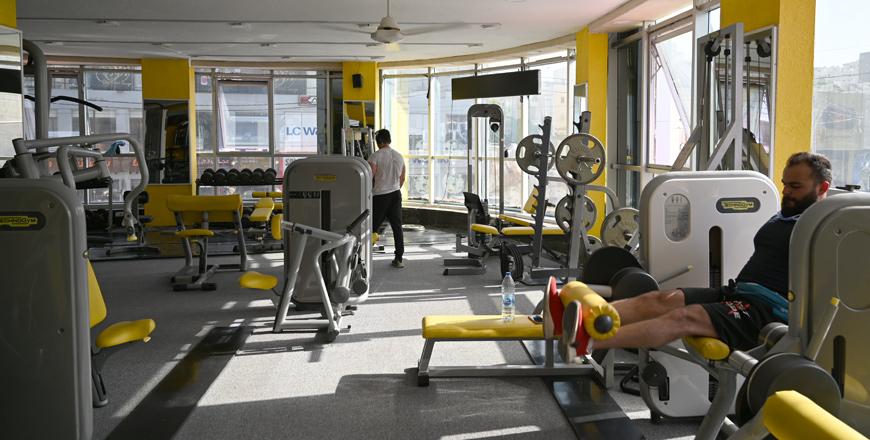You are here
Health enthusiasts struggle to stay fit amid gym closures
By Farah Al Asmar - Mar 31,2021 - Last updated at Mar 31,2021

Fitness enthusiasts are seen working out in a gym in Amman in this photo taken prior to sports centres’ closures as part of government measures to stem the spread of the COVID pandemic (Photo by Amjad Ghsoun)
AMMAN — Gyms have always served as a haven for people to relieve stress and strengthen their bodies and minds. According to fitness enthusiasts, closure of sports centres has unfavourable impact on the physical and psychological wellbeing of gym goers.
Physical exercise is essential for the prevention and treatment of depression, Fadia Abu Haltam, a psychologist, said.
Exercise has a great effect on the production of endorphins and dopamine. Endorphins are chemicals produced by the body to relieve stress and pain; whereas, dopamine is a neurotransmitter that plays a major role in our sense of pleasure, Abu Haltam added.
Abu Haltam further stated that the level of endorphins and dopamine in the body is inversely related to depression. Depression occurs when the level of endorphins and dopamine in the body are low. Working out raises endorphin and dopamine levels in the body, resulting in better psychological outcomes for those who are already diagnosed with depression as well as those who are not.
The importance of gyms to psychological wellbeing goes beyond the need to raise endorphin and dopamine levels. Abu Haltam stated that workouts are typically associated with lower cortisol levels in the body. High levels of this hormone in the body are associated with increased stress.
“Controlling cortisol hormone levels becomes critical at a time when a strong immune system is our strongest weapon in the fight against COVID 19. Cortisol, at high levels in the body, attacks the immune system and weakens it,” added Abu Haltam.
Furthermore, many people seem to have adopted negative eating habits as a result of the restrictions on social life introduced to combat the pandemic. In many cases, people have resorted to eating more as a stress coping mechanism, Tala Dihmes, an Amman based nutritionist, said.
The effect of the pandemic on the amount of physical activity performed by people cannot be overestimated. A study titled “Worldwide Effect of COVID-19 on Physical Activity: A Descriptive Study” published by the Annals of Internal Medicine journal showed that the average daily step count of participants in the study, who come from 187 countries, decreased by 5.5 per cent within 10 days from the declaration of the pandemic in a given country. Further, the study showed a reduction of 27.3 per cent of the daily step count of participant within a month from the declaration of the pandemic in a given country.
“I tried to work out in my house, but my apartment does not have suitable space. I am extremely concerned about the physical consequences of not being able to build muscles and be as physically active as I was when gyms were available. What is depressing is that I cannot do anything about it,” said Ibtisam Khasawneh, a gym goer.
While some people resort to exercise outdoors in the absence of gyms, this option might not work for everyone.
“It is harder for women to play sports in public places due to cultural reasons. Also, walking or jogging on streets can be pretty unsafe,” Khasawneh said.
“I give online lessons via Zoom to several subscribers, but it is not the same as being in the gym. Many are noticeably less motivated to maintain their body weight. When one exercises in group, the level of commitment and motivation is much higher. This is exactly why gyms are vital,” said Suzan Al Awamleh, an instructor of Zumba, a dance-based workout programme.
Related Articles
A saliva test for teenage boys with mild symptoms of depression could help identify those who will later develop major depression, a new study says.
AMMAN — In an effort to promote health and well-being within the local community, 37-year-old Jordanian Mohammad Hijazi is spearheading an i
AMMAN — Amid the stress and fears residents of the Kingdom are experiencing in relation to the novel coronavirus, Jordanian nutritionists ar

















